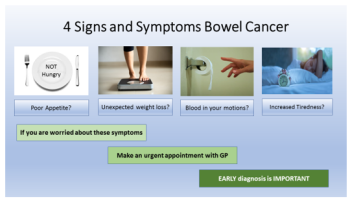
BOWEL CANCER AWARENESS
Bowel cancer is also known as colorectal cancer. In particular it affects the large bowel, which is made up of the colon and rectum.
Many bowel cancers develop from pre-cancerous growths, which are called polyps, but not all polyps develop into cancer. Removing the polyp before it develops into a cancer is very important.

INTERESTING STATISTICS
- Fourth most common cancer in the UK (Bowel Cancer UK, 2022)
- 2nd most common cancer that kills (Bowel Cancer UK, 2022)
- 53% of people with bowel cancer survive beyond 10 years (Cancer Research UK, 2022)
In Northern Ireland an average of 1,100 people are diagnosed with colorectal cancer each year (Bowel Cancer UK, 2022).
DEMOGRAPHICS
- Bowel cancer can affect anyone of any age and statistics suggest the age people are diagnosed is getting lower.
- 94% are diagnosed in people over the age of 50
- 59% are diagnosed in people aged 70 or over.
- 1 in 15 men and 1 in 18 women will be diagnosed with bowel cancer.
SIGNS AND SYMPTOMS
Occasionally, bowel cancer does not have any symptoms and so it is very important that you completed as soon as possible
The most frequent symptom of bowel cancer is anaemia. Possible signs of this is passing blood in a motion or through wiping after a motion. Having a bowel cancer can change a person’s bowel habit, for example increased diarrhoea or a feeling of fullness, even after a motion has been passed. Additional symptoms such as an unexplained weight loss or reduced appetite is recognised as a common side-effect of bowel cancer. However sometimes people will notice that they get tired easily, dizziness or breathlessness during activities than they would normal have found manageable.
There are other reasons why these symptoms may occur, however it is important to have investigations so you can have an accurate diagnosis.
THINGS YOU CAN DO
- If you/ family member or friend experiences some or all of these symptoms then it is important to make an appointment with the GP and explain that you are concerned that you have bowel cancer. Your GP may ask you to have a blood test or a QFIT to investigate your concerns.
- If you/family member or friend are invited for screening for bowel cancer then please complete the test, so they can be fully assessed.
These are a few websites you might want to have a look at or refer a family member or friend to for further information:
- https://www.bowelcanceruk.org.uk/about-bowel-cancer/symptoms/
- https://www.macmillan.org.uk/cancer-information-and-support/bowel-cancer/signs-and-symptoms-of-bowel-cancer
- https://www.cancerresearchuk.org/about-cancer/bowel-cancer/symptoms


